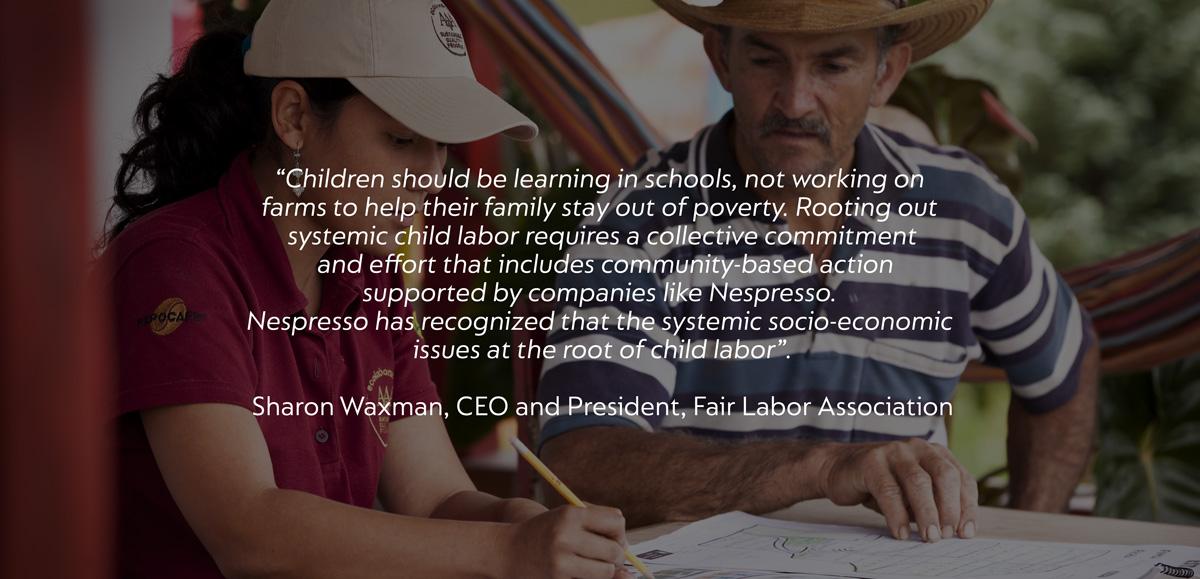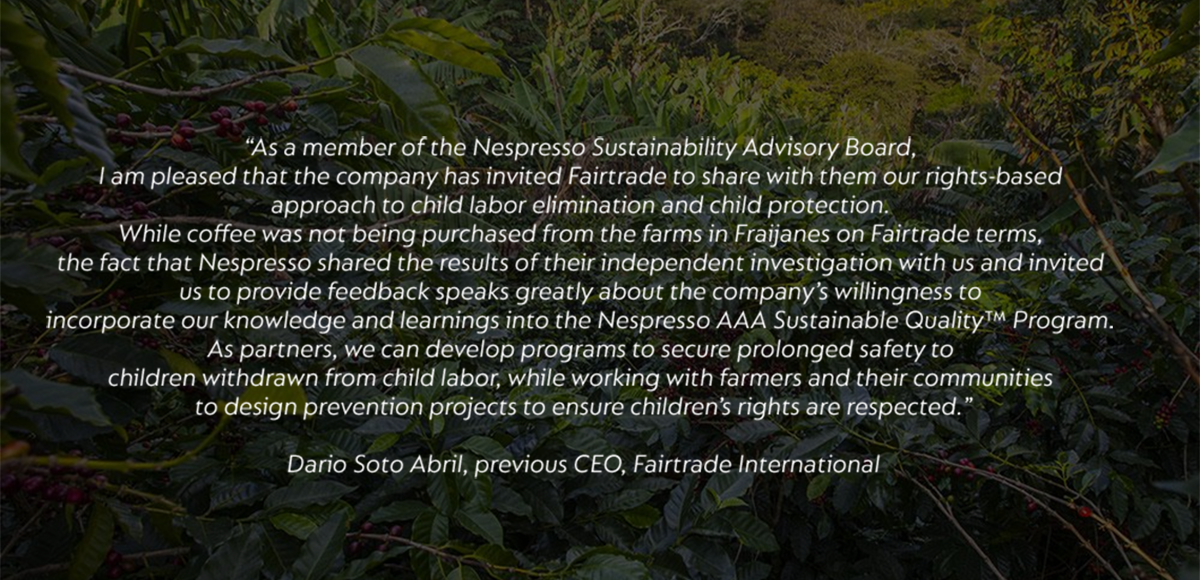CONTEXT
In March 2020, a British TV channel reported that child labor was taking place on coffee farms that supply Nespresso in the Guatemala Fraijanes region. We immediately launched an investigation and identified three confirmed cases of child labor out of the 374 farms that supplied coffee to Nespresso, at the time, in the Fraijanes region.
As a result of the investigation, Nespresso devised six key immediate actions (see below) to promote the safety of children within the coffee growing communities of Guatemala.
NESPRESSO POSITION ON CHILD LABOR
Nespresso has a zero tolerance of child labor. It is unacceptable. Where there are claims that our high standards are not met, we act immediately. The prohibition of child labor is a key component of the Nespresso AAA Sustainable Quality™ Program. This Program was developed in 2003 in cooperation with the NGO the Rainforest Alliance, in compliance with the International Labor Organisation (ILO) standards. Coffee farmers must comply with our zero tolerance to child labor as a pre-requisite in order to join our AAA Sustainable Quality™ Program. More than 110,000 farmers are part of the Nespresso AAA Program in 15 countries.
THE NESPRESSO GUATEMALA CHILD LABOR ACTION PLAN – 6 KEY ACTIONS
The Nespresso Guatemala Child Labor Action Plan has been developed to tackle the complex issue of child labor and its root causes in the country. Its six action points were implemented together with key NGO partners, the Rainforest Alliance, an international non-profit organization working at the intersection of business, agriculture, and forests to promote responsible business, the Fair Labor Association, which has dedicated expertise in labor rights, and Enveritas, a non-profit that provides sustainability solutions and promotes the wellbeing of smallholder coffee growers, during the harvest season 2020/2021.
The six action points implemented in Guatemala:
- We have doubled the team of agronomists and hired dedicated social workers who supported the local families who grow coffee during this past harvest to safeguard their children and reinforce Nespresso’s zero tolerance child labor policy. Our agronomists also conducted unannounced visits and sessions with social workers dedicated to social conditions of the farmers, helping them address the identified challenges.
- The Rainforest Alliance undertook independent monitoring and unannounced audits, which are part of its current certification program and will be maintained in its new 2020 standard, which goes into effect 1 July 2021. The Rainforest Alliance also confirmed that additional trainings and relevant tools related to the issues of identifying child labor were provided to the agronomists, and worker monitoring systems were put into place by farmers. Enveritas also conducted announced visits and carried out independent monitoring specifically on the aspect of child labor in the farms during harvest.
- We increased the number of dedicated education and awareness sessions on the risks of child labor for cooperatives, agronomists and farmers. FLA developed and conducted dedicated trainings for our agronomists on how to engage with farmers in a participatory way on the child labor topic. A Children’s Right module was also covered by Terre des Hommes and Nespresso.
- The Fair Labor Association developed and conducted dedicated trainings for our agronomists on how to engage with farmers in a participatory way on the child labor topic.
- We have doubled, with a local NGO, the capacity to welcome children in child friendly spaces on farms, which helps parents to mitigate the safety risks associated with leaving their children unattended at home. These safe places for migrant pickers’ children on farms provide education and meals to them, while their parents work in the farm. The facilities also offer basic medical consultation for the children. We are currently exploring different options with local NGOs to expand a childcare initiative in Fraijanes.
- The Fair Labor Association also supported the development of a grievance mechanism with farmers who are part of the coffee cooperatives. Along with introducing the technology, we are now helping the cooperatives to understand the benefits of grievance mechanisms, develop the grievance process, and build the capacity to manage grievances.
We will continue to build on and expand these activities.
We strongly believe that working in collaboration and under advisement from key local stakeholders is paramount to ensure that appropriate actions are taken on the ground to bring a positive change moving forward. That is why we are developing a network of local organizations, the Community Child Labor Committee (CCLC), in order to support and work with us on prevention as well as remediation activities when a child labor case is uncovered. With the Fair Labor Association, we have identified and are engaging with specialized civil society organizations and other local agencies to form this committee. Incorporating worker and farmer voices on this topic will not only identify the issues to address before they become major problems but also encourage ideas and views to find collaborative and sustainable solutions to systemic issues such as child labor.
The Fair Labor Association will also support awareness raising discussions with farmers and workers, providing guidance and advice on how to keep detailed records and documentation for temporary workers. As part of this work, FLA will train to our AAA agronomists on the methodologies to record workers and their family members to ensure proper and fair remuneration. In addition, the FLA is currently conducting the root cause analysis we committed to run. The results and recommendations will inform a longer-term strategy to tackle child labor in Guatemala, which we will communicate later in the year.
Guillaume Le Cunff, CEO of Nespresso, said: “Protecting children from exploitation is of paramount importance to us. It’s critical for companies such as ours to work hand-in-hand with coffee farming communities to combat this issue, which is complex and driven by a variety of economic, social and cultural factors. There is no easy answer. We have acted quickly not only to investigate the issue, but also to implement immediate, concrete actions to address it. We will continue working with our different partners to devise longer-term strategies to protect children and have a positive impact on the local farming communities within the Nespresso AAA Sustainable Quality™ Program.”
This action plan comes on top of the regular work done by the dedicated Nespresso AAA agronomists, who assess and raise awareness of social and environmental performance (including child protection) when they visit AAA farms, as part of their overall support to farmers to increase productivity and yields of high quality coffee, which directly leads to improved incomes.
Economic factors are a major driver in child labor. Nespresso continues to pay a premium to farmers for their AAA coffee, which is proven to improve the welfare of coffee farming communities and reduce the risk of child labor. Nespresso already pays the highest prices for coffee in the region of Fraijanes.
“Our action plan has been implemented and will be monitored closely to ensure it makes a tangible difference to properly protect children in the coffee farming communities with whom we work. These actions complement our existing, ongoing work direct with AAA farmers in the region. We know that the Nespresso AAA Sustainable Quality™ Program has had a significant, positive impact on farmers, farm workers and farming communities in Guatemala and around the world, and we are committed to continuing this work,” continued Guillaume Le Cunff.


